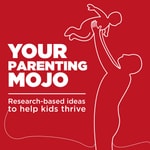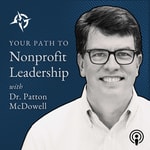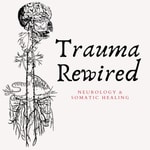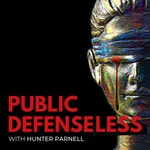Your Parenting Mojo - Respectful, research-based parenting ideas to help kids thrive – Details, episodes & analysis
Podcast details
Technical and general information from the podcast's RSS feed.

Your Parenting Mojo - Respectful, research-based parenting ideas to help kids thrive
Jen Lumanlan
Frequency: 1 episode/11d. Total Eps: 291

Recent rankings
Latest chart positions across Apple Podcasts and Spotify rankings.
Apple Podcasts
🇨🇦 Canada - parenting
01/08/2025#81🇨🇦 Canada - parenting
31/07/2025#61🇫🇷 France - parenting
31/07/2025#95🇨🇦 Canada - parenting
30/07/2025#82🇫🇷 France - parenting
30/07/2025#72🇫🇷 France - parenting
29/07/2025#39🇫🇷 France - parenting
28/07/2025#63🇩🇪 Germany - parenting
25/07/2025#96🇩🇪 Germany - parenting
24/07/2025#66🇨🇦 Canada - parenting
23/07/2025#87
Spotify
No recent rankings available
Shared links between episodes and podcasts
Links found in episode descriptions and other podcasts that share them.
See all- https://pregnancypodcast.com/
170 shares
- https://www.upbringing.co/resistapproach
104 shares
- https://wakingup.com/
54 shares
RSS feed quality and score
Technical evaluation of the podcast's RSS feed quality and structure.
See allScore global : 53%
Publication history
Monthly episode publishing history over the past years.
223: What, Why, and How to Parent Beyond Power
Episode 223
vendredi 6 septembre 2024 • Duration 58:01
222: How to cultivate Menstrual Cycle Awareness with The Red School
Episode 222
lundi 26 août 2024 • Duration 01:02:48
- What phases does my body go through each month?
- How can I start becoming more aware of these phases through Menstrual Cycle Awareness?
- How can I align my activities with my energy levels, creativity, and arousal - even in the real world, which wants me to go-go-go all the time?
- How is my inner critic aligned with my cycle, and how can I use its knowledge to help me?
- How can I navigate Menstrual Cycle Awareness if I've had a difficult relationship with my periods and with fertility?
I'd encourage you to listen to this episode if:
- You menstruate and want to better understand how menstruation affects your life
- You're raising a child who will menstruate and want to prepare them to feel 'at home' in their bodies
- You love someone who menstruates and want to be better attuned to them
- You're raising a child who will never menstruate, but you want them to appreciate menstruation and know how to effectively support people who menstruate.
In other words, everyone will get something out of this episode! Learning Membership The Learning Membership will open again soon! The membership helps you to support your child’s intrinsic love of learning, while also equipping them with the skills they’ll need to succeed in the age of AI. You’ll learn how to see and follow your child’s interests so you can support them in deep inquiries. You won’t have to drag them through it like you would a workbook or a curriculum (so no need to reward them with screen time!) because they will WANT to learn. They’ll be excited to do it, and they’ll bring you along for the ride. If you already know you’re in, you can sign up for the Learning Membership. Click the banner to learn more! https://yourparentingmojo.com/learningmembership/ ...
214: Ask Alvin Anything: Part 2
Episode 214
lundi 27 mai 2024 • Duration 01:05:25
Want to know how my autism self-diagnosis has affected my relationship with my husband? (I will apologize to autistic listeners here as an ableist perspective is still something we're working on, and he also uses some outdated terminology probably from an old book he's started twice - but not yet finished - on supporting partners with Asperger's Syndrome.)
Curious about whether he identifies as Filipino-American... or not? And how his perspective on race differs from mine?
Want to hear how he sent a chicken up into space...and then found out what the two pink lines of a pregnancy test mean?
Last year, when we were coming up on our 200th podcast episode, I asked my husband Alvin if he would be willing to record a podcast episode. I had envisioned listeners asking the questions and him answering - but he wanted me to join as well!
One of the first things we learned was that Alvin cannot be succinct. (Well, technically speaking, this was not a new lesson for me - and interviewer Iris had tried really hard to prepare him for succinctness by asking for his 'elevator pitch' - but he just couldn't do it!)
So we ended up cutting the episode when it was already over an hour and we hadn't covered half of the questions listeners had submitted...and interviewers Iris and Corrine graciously agreed to return for a Part 2. So here it is!
Other episodes mentioned
Jump to Highlights
01:22Introducing this episode
04:28Alvin talks about how Jen's autism diagnosis helps their relationship while Jen shares how it helps in their daily life and parenting.
12:47Alvin and Jen talk about how they decided to become parents.
25:10Alvin discusses his upbringing in a predominantly White area, his evolving awareness of his Filipino heritage, and how his wife Jen's advocacy work has shaped his understanding of race and culture.
38:13Alvin talks about his journey from wanting to be seen as White to embracing his Filipino heritage and identifying as a Brown person.
46:32Alvin encourages dads to be actively involved in parenting, prioritize their partners, and be present in family life. 57:15Alvin and the hosts engage in a quickfire round of questions, discussing topics from parenting to personal preferences.
01:00:50Wrapping up
SYPM 014: The power of healing in community
dimanche 1 août 2021 • Duration 51:42
141: The Body Keeps The Score with Dr. Bessel van der Kolk
dimanche 25 juillet 2021 • Duration 47:12
The Body Keeps the Score: Brain, Mind, and Body in the Healing of Trauma (Affiliate link).
Jump to highlights:- (01:00) Introducing Dr. van der Kolk
- (01:58) Invitation to the Taming Your Triggers Workshop
- (02:56) A note on some technical difficulties we had while recording this episode
- (03:14) People often want easy answers: Talking about why we feel like we need pills and alcohol to deal with trauma and not make use of other methods which seem more beneficial
- (08:16) "We become who we are based on the experiences we had and...
SYPM 013: Triggered all the time to emotional safety
samedi 17 juillet 2021 • Duration 53:49
- (01:00) Inviting listeners to join the Taming Your Triggers workshop
- (04:43) A little bit about Chrystal
- (11:06) Chrystal’s journey as a parent
- (13:58) How Chrystal found it difficult to build lasting relationships with parents who were raising their children the same way they were raised and how she found her people in the Taming Your Triggers community.
- (16:32) The fight, flight, freeze, and fawn responses and how Chrystal resonated to the fawn response.
- (18:22) The first time Chrystal was able to connect what she’s feeling in her body with her belief systems
- (20:36) As the eldest of eight children, Chrystal felt that it was her responsibility to make sure everyone is happy when her mother couldn’t cope due to severe postnatal depression, and this has continued on with her character now that they’ve grown up
- (24:51) When Chrystal decided to set boundaries and have it respected, she found out that her family’s issues can resolve themselves without her getting involved
- (28:14) The profound shift with for Chrystal in terms of what changed in her family after going through the Taming Your Triggers workshop is that she is now able to see situations as more than a win-lose situation
- (32:20) With two...
140: Mythbusting about fat and BMI with Dr. Lindo Bacon
dimanche 4 juillet 2021 • Duration 55:23
- (01:00) Introducing Dr. Lindo Bacon and starting our series of episodes on the intersection of parenting and food
- (02:22) Stripping the word ‘fat’ of it’s pejorative meaning and reclaiming the term while acknowledging that it may be jarring for some people
- (03:09) Kicking off the conversation with how we measure health using BMI and how it might not be accurate
- (05:03) The resistance to Katherine Flegal’s seminal research in weight and longevity
- (05:49) The development of the Body Mass Index was with scientific bias to fit the bell curve
- (07:30) Higher body weight does not necessarily mean a person has greater risk of poor health
- (10:59) We actually know that the research is highly exaggerated in terms on the role that it plays on health
- (13:16) Dr. Bacon’s turning point: When they found out that BMI recommendations were created by an organization funded by pharmaceutical companies who produce weight loss drugs and products
- (17:35) Taking the issue one step further with the American Medical Association’s recommendation whether to categorize obesity as a disease or not
- (19:19) The Obesity Paradox is an observation in the research that people who are obese who get the same diseases as those with ‘normal’ weight are living longer
- (21:15) The concept of dieting just doesn’t work according to the data
- (30:33) A story of Dr. Bacon’s and their father’s knee problems
- (34:40) Individual factors only accounts to 25% to somebody’s total health outcomes and social determinants account to about 60%
- (42:05) It is cool right now to be your authentic self but not everyone can so easily be their authentic self when their authentic selves are not valued by society at large
- (45:48) Improving the health of individuals is more communal than individual
Resource Links:
- Health at Every Size, by...
139: How to keep your child safe from guns (even if you don’t own one)
dimanche 20 juin 2021 • Duration 44:55
- (01:00) Indoor playdates are ramping up...will your child be safe?
- (02:29) Introducing Dr. Nina Agrawal, pediatrician and co-founder of the American Academy of Pediatrics' Gun Safety Committee in New York State
- (02:58) Understanding how big is the scope of gun violence against children
- (06:15) The Dickey Amendment: Explaining the massive lack of data and research on gun violence and safety
- (11:24) The ways that gun violence affects children that we might not expect
- (12:32) “I get woken up at night to the sound of gunshots.”
- (17:09) The racial disparity in how children are affected by gun violence
- (20:46) More people purchased guns in 2020, and there are more first-time owners too
- (23:39) The statistical likelihood of children coming to harm if they live with a firearm in their household
- (27:00) Just telling kids not to touch guns doesn't work (even if you think of your child as one who is 'sensible,' and you've talked with them about gun safety)
- (30:45) The Asking Saves Kids Campaign helps to keep kids safer
- (33:06) The surprising link between children involved in gun violence and the Peloton treadmill recall
- (36:07) In American culture, banning all guns can't be the answer
- (40:52) Effective Child Access Laws
- (41:45) How to create safer environments for children through building communities
[accordion] [accordion-item title="Click here to read the full transcript"] Jen Lumanlan 00:02 Hi, I'm Jen and I host the Your Parenting Mojo Podcast. Jen Lumanlan 00:06 We all want her children to lead fulfilling lives, but it can be so hard to keep up with the latest scientific research on child development and figure out whether and how to incorporate it into our own approach to parenting. Here at Your Parenting Mojo, I do the work for you by critically examining strategies and tools related to parenting and child development that are grounded in scientific research on principles of respectful parenting. If you'd like to be notified when new episodes are released, and get a free guide called 13 Reasons Why Your Child Won't Listen To You & What To Do About Each One, just head over to YourParentingMojo.com/SUBSCRIBE. You can also continue the conversation about the show with other listeners in the Your Parenting Mojo Facebook group. I do hope you'll join us. Jen Lumanlan 01:00 Hello, and welcome to the Your Parenting Mojo Podcast. And today we're going to discuss a topic that I think is about to come into parents' consciousness in a way that it really hasn't as much over the last year. And for some of us, that's a result of our privilege....
138: Most of what you know about attachment is probably wrong
dimanche 6 juin 2021 • Duration 01:06:04
Cornerstones of Attachment Research (Affiliate link).
Jump to highlights:- (03:30) Download the free Right From The Start Roadmap
- (06:11) Dr. John Bowlby, who is known as the founder of attachment theory
- (06:40) A brief overview of attachment theory
- (08:06) What is attachment theory
- (09:44) A closer look at the word attachment
- (12:55) Five aspects out of Freud's psychoanalytic theory
- (14:32) 44 Juvenile Thieves - One of the major ideas about separation from parents
- (17:50) What is the word monotrophy
- (18:49) The four dimensions that distinguish African-American views of motherhood from American views by Dr. Patricia Hill Collins
- (20:49) Aka Pygmy tribe in Africa
- (21:37) What is PIC or Parental Investment in the child Questionnaire by Dr. Robert Bradley
- (24:19) The Strange Situation Procedure developed by Dr. Mary Ainsworth
- (30:30) White middle class mothers in Baltimore stand for what attachment should look like in families of all types around the world
- (33:36) Two main cross cultural studies
- (40:13) The cognitive thinking component of the attachment relationship
- (47:29) What is Outcomes
- (01:01:25) Summary
[accordion] [accordion-item title="Click here to read the full transcript"] Jen Lumanlan 00:03 Hi, I’m Jen and I host the Your Parenting Mojo podcast. We all want our children to lead fulfilling lives. But it can be so hard to keep up with the latest...
137: Psychological Flexibility through ACT with Dr. Diana Hill
dimanche 23 mai 2021 • Duration 57:30
ACT Daily Journal: Get Unstuck and Live Fully with Acceptance and Commitment Therapy (Affiliate link).
Jump to highlights:- (01:26) What is ACT or acceptance and Commitment Therapy
- (02:07) What is this thing psychological flexibility?
- (03:48) What are the components of psychological flexibility?
- (08:07) Cognitive diffusion
- (11:38) The idea that we could believe that our thoughts are not true is mind boggling to a lot of people
- (16:36) Values and parenting in particular is such a good one to discuss
- (18:20) Values are something that are deep within you, that you can pull upon, when you've got nothing left
- (19:10:) The idea of the choice point
- (23:36) Perspective taking is probably one of the most important skills we can do for ourselves
- (27:01) How do we live out committed action
- (33:55) Our children are naturally beginner's mind
- (35:18:) One of the things that actually sets humans apart from robots, is our ability to think outside









